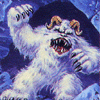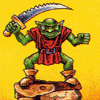Daedalus wrote:However, Baker also mentioned his prototype underwent simplification. Ansell's story that "Stephen Baker, Roger Ford, and Ben Rathbone had damn all to do with HQ's developement" fits here if by "working game" Ansell is referring to a rules set. It would then stand to reason Jervis Johnson was involved in Hero Quest development, as well. This is corroborated by the White Dwarf promo.
Just dropping by to add that Jervis Johnson has long been known for designing games that are 'simple yet elegant', without too many fiddly bits / options / bling / chrome. It's something that has annoyed a lot of tabletop wargamers and hardcore Games Workshop fans who
prefer lots of fiddly bits, thank you very much.
Seeing Jervis's name on that promotional flyer for HeroQuest, and reading that Baker's prototype had to be simplified, makes me wonder if Jervis's involvement might explain the curious differences between the European and North American editions.
I have absolutely no evidence for the following scenario, but I'm picturing something like this:
Baker designs his prototype for Milton Bradley, based on a very simplified 'lite' version of 80s D&D--hence the single-use Vancian spells and the heroes closely matching old-school Basic classes.
Games Workshop is then meant to give it a Warhammer coat of paint. Orcs, Fimir, Chaos and so on.
However, GW's designers feel Baker's prototype is still too blinged up and fiddly for the mass market--at least the British market. And because GW still makes actual games at the time, and is steadily moving away from open-ended RPGish products in favour of competitive games with win conditions that don't need gamesmasters or referees, it takes the view that HeroQuest is meant to be a
game, not D&D with training wheels. Possibly one that will lead players into the miniatures collecting / tabletop wargaming hobby that GW is coming to dominate--whereas Baker's original idea was more to lead players into the pen-and-paper RPG hobby.
So Jervis at GW swoops in with his trademark 'elegance!' doctrine and strips some of the fiddliness and detail out, producing the very straightforward EU ruleset and its really quite impressively thin and concise rulebook. The EU edition has little in the way of 'RPG training' instructional text--it's a boardgame first and foremost. It also allows for plenty of competition between the Hero players. Shortly afterward a 2nd edition of the EU rules is released, making a few tweaks and adding The Trial.
Baker thinks, "Aw man, I
liked all that cool bling, and wait a minute, wasn't the whole point of this project to make a lite version of D&D in disguise? This UK edition is going to pull kids in the wrong direction!" And in one way or another he manages to cram some of the cut content back into the game for the North American release. Thus the NA game has a rather denser, more D&D-ish rulebook with a lot of instruction on how to be a good Dungeon Master, more detailed rules for traps and things, extra artifact cards, extra body points for monsters (requiring basic bookkeeping) and so on. It winds up being suitable for a slightly older audience and more obviously 'my first RPG'.
And somewhere along the way, the name Morcar in the EU release--which sounds properly Tolkienesque but is perhaps too easily mixed up with Mentor--changes to Zargon in North America, which sounds like a Saturday morning cartoon villain (in my opinion) but at least can't lead to confusion... and also happens to be the name of a baddie from an old D&D module. Hmm.
Obviously the above is
pure conjecture. Many people feel the NA ruleset was an improvement. (I'm on the fence.) But some things, like having three types of search instead of two in the NA edition,* don't feel like improvements so much as concepts from an earlier, complicated prototype that were stripped out as the game was refined... and then put back in because the original designer had a soft spot for them.
*I note that in Basic D&D at least, secret doors were treated separately to traps. The Elf was good at finding the former, the Dwarf good at finding the latter. So there's reason to suspect that Baker's prototype would have those two things as different searches, plus treasure as the third. Combining secret doors and traps into a single search feels like a logical refinement later in the design process, and I think it's telling that it reverted (if my hunch is right) to separate searches in the NA edition.































